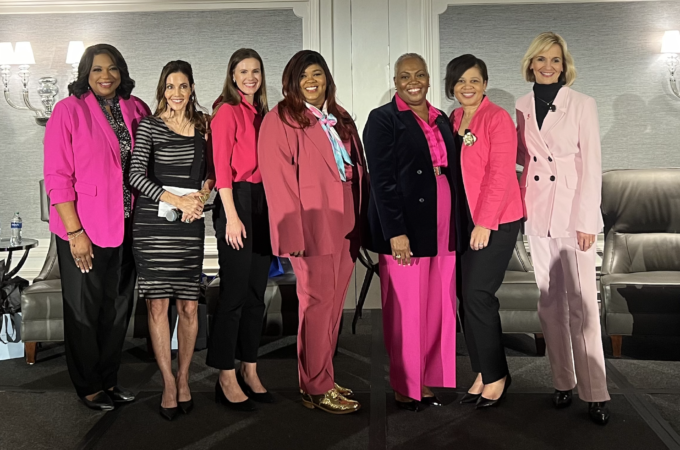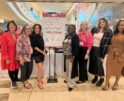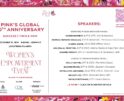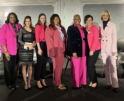
Authenticity at Work Looks Like This
Some of America’s top women business leaders shared what it’s really like to show up authentic at work: Think—telling the boss you’re not coming in for six months because your baby is sick or, leaning on other women leaders at the company for mental health support or, coming to work with braids in your hair to role model what authenticity means.
Nearly 700 signed on to watch this year’s 19th Annual Fall Women’s Empowerment Event live and live-streamed from the downtown Atlanta Ritz-Carlton Hotel on the heels of the summertime Supreme Court decision that shot down affirmative action and after Barbie, the female-directed, highest grossing film of all time.
With the spotlight on authenticity, Delta Air Lines EVP and Chief Experience Office Allison Ausband said she and other leaders at the airline turn to one another to safeguard and protect their mental health. “We get together every other month. We all go to dinner… to talk about how they’re staying healthy, and what they’re going through. We just spend time with each other talking about challenges and opportunities.” Check Out The Video & Photo Gallery!
Cox Communications EVP & Chief People Officer Kia Painter also experienced what it means to demonstrate authenticity in what might be construed as risky in corporate America—while interviewing a job candidate. “She was afraid to come to our company. She said, ‘I have to ask, is it going to be OK if I wear my braids.’ I knew at that moment I had to tell her, ‘On Monday I am Beyonce, on Tuesday I am Brianna, on Thursday I am Pink.’” The crowd roared with laughter as Kia shared while wearing gold shoes which moderator and award-winning journalist Condace Pressley, Director of Community Public Affairs, WSB-TV was quick to point out.
Authenticity got real and fast for IBM Chief Leadership, Culture, and Inclusion Officer Kitty Chaney Reed after the birth of her first child. “I was like ‘I’m going to drop this baby and go straight back to work and I did. Then he got really sick.’” She had to make the tough phone call to her boss: “Sorry. For six months I can’t work. If that means the end of our journey, fine. That’s where my priorities are right now.” It worked out. She went part-time for six months and then re-engaged full-time.
Kitty says she found her dream job because a sponsor had her write down exactly what she wanted. First, she resisted, but the assignment “provided me a clarity I didn’t have.” That’s not all. “Had folks not known that was the job I wanted, I might not have been considered.” She urges others to figure out what they want and make sure others know it.
Not all the panelists moved into their big jobs after carefully laid plans. The Coca-Cola Company’s Chief Diversity, Equity & Inclusion Officer Tameka Harper remembers when she received the call for the job she holds today. She told the caller, “I think you reached out to the wrong Tameka. Don’t worry. We can find her.” Having started her career as an electrical engineer and holding numerous roles at Coca-Cola over her 23 years, “Tameka as Chief Diversity Officer was the farthest thing” from her mind. How did she go from electrical engineer to the CDO job she is so passionate about today? “When I have that answer I’ll let you know.”
Newest to her job among the leaders, Invesco’s Global Chief of Staff Laura Lee said, “The opportunity came out of the blue. I had just returned [to McKinsey where she was a partner] from maternity leave. I took the calculated risk.”
While women represent more than 58 percent of the US workforce, only 35 percent hold senior leadership positions, though companies with women execs are 30 percent more likely to outperform the others. With even fewer women in C-Suite jobs still today, PINK event leaders shared why they think some women get ahead and others don’t.
Allison says it’s about stepping up for projects you want, even if you’re not ready. She says it was this kind of risk that catapulted her career, advancing from flight attendant to C-Suite. She raised her hand for a “difficult and high-profile assignment at Delta,” big stakes at the company with 100,000 employees and 200 million customers. “I didn’t think I had the capability to do it. I spent a lot of time in the Emory library to be prepared. It opened every door imaginable for me.”
Laura says it’s as simple and difficult as being a good listener. “I don’t think it’s something a lot of people are good at. There are a lot of good talkers. The most successful people are good listeners.”
Tameka said it’s being able to “solve the next problem.” For Kia, it’s admitting when you made a mistake. She recalls failing to engage appropriate stakeholders on a key project which was “stopped cold.” “Then you got to go back and say ‘this was a miss. My bad.’ This is how I need your support to go forward.”
How do you bounce back? “I have my circle of women I feel safe with,” said Kitty. “One is a next-door neighbor, a childhood friend [and] people at work I can have those safe conversations with.” With the recent Hamas terrorist attacks on Israel, Kitty said “Last week was one of the hardest in this job. I learned very quickly ‘You’re not going to win with this one.’ I had to go back to the women who supported me to get through and make good decisions for the company and for me. It really wasn’t mine to fix.”
Allison remembers the aftermath of one big miss. “I spent a night crying my eyes out. I had let the team down, my boss down. Had this not happened I would not have learned how to be better.”
Leaders like Allison have learned to give themselves a break at home too. With her top job at the world’s largest airline which operates 24/7, she doesn’t blame herself for being an imperfect mother. “Have I left [my children] on the curb at school and nobody’s picked them up? Yes.” But she also says she’s found a way to “never miss the most important things,” adding “What I would say is they are more resilient.”
In conclusion, Condace asked the leaders what advice they’d give their 22-year-old selves? Tameka said “Enjoy the journey. I’m such a goal-oriented person I’m constantly looking at the destination and I miss the journey.”
With pandemics and wars and so many other challenges these days, Kia acknowledges “I get scared.” The solution for her? “Stop trying to be fearless and just be great.”
Laura said, “Get out of your head.” Kitty said, “Dream bigger.” Allison said raise your hand, “even though you may be scared to death.” Why? Because “it made all the difference for me—you deserve a seat at the table.”
Companies sponsoring this event include Gold Sponsors: The Home Depot and Southern Company; Silver Sponsors Cox Enterprises and Prudential; Bronze: The Coca-Cola Company, Delta Air Lines, Leapley Construction, Atlanta Homes and Lifestyles, and Deloitte.
In PINK’s tradition of supporting nonprofits that help women and girls at every event over the last two decades, the women attending helped raise nearly $2,000 at the event for Covenant House Georgia to aid homeless youth.
“I had no idea being your authentic self could make me as rich as I’ve become. If I had, I’d have done it a lot earlier.” –Oprah Winfrey
By Cynthia Good
Recommended
-
Fall 2024 EventNovember 19th, 2024
-
Pink ProgramOctober 20th, 2024
-
PINK’s Event Featured Co...September 19th, 2024
-
20th Anniversary Women’s...August 9th, 2024
-
Authenticity At Work Looks Lik...November 19th, 2023















